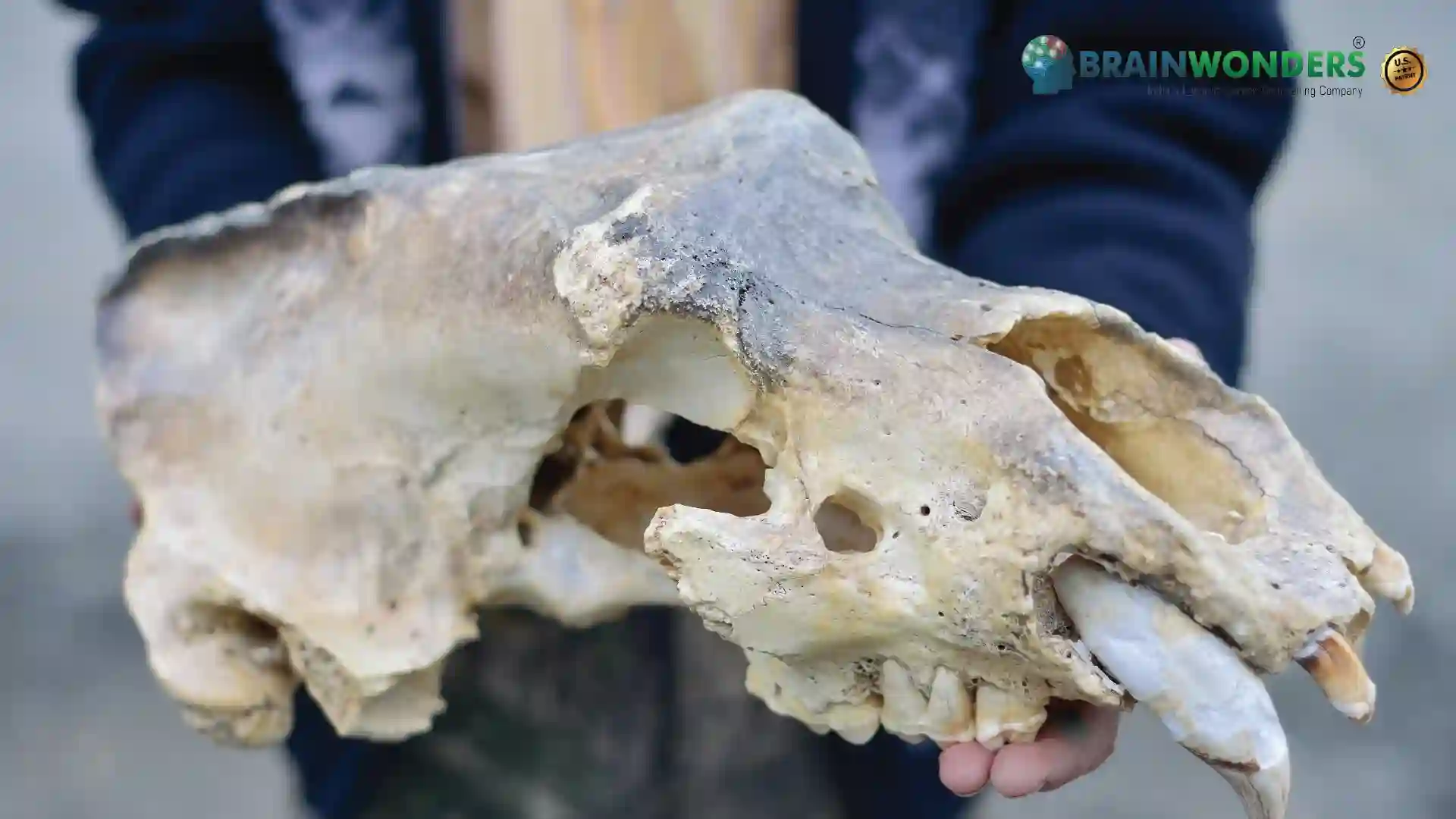How to become a Paleontologist
Overview, Courses, Exam, Colleges, Pathways, Salary

Overview
Who is Paleontologist ?
A palaeontologist is a scientist who studies the history of life on Earth by analyzing fossils, remains, and other traces of ancient organisms. They explore prehistoric ecosystems, decipher evolutionary processes, and reconstruct the Earth's past by studying fossilized plants, animals, and other remnants. Palaeontologists play a crucial role in uncovering the mysteries of our planet's geological and biological evolution, contributing to our understanding of ancient biodiversity, climate change, and the origins of species. By examining the fossil record, palaeontologists provide insights into the intricate web of life that has existed over millions of years, shedding light on the dynamic interplay between life forms and their environments.
Typical day at work
What does Paleontologist do?
Job description, Profiles, Roles and Duties:
- Develop methods and systems for collecting data tailored to a given era, site or project goal
- Gather information from observations, satellites, GIS / GPS and concussive devices
- Analyze and test samples in a laboratory
- Record and manage observational records
- Analysis of field data, laboratory specimens and other information sources to reveal patterns of ancient life and origins
- Communicate with project leaders, managers, and other staff through routine, scheduled field status reports and research findings presentation
- Participate in field surveys, research, monitoring and data recovery
- Counsel organizations on the future effect of legislation, initiatives, and goods
- Develop and notify scope, schedules, and budgets of projects
- Steer international and federal protocols, regulations and best practices
- Equipment and instrument testing and calibration
- Safeguard quality control, management, and effective field data monitoring
- Monitor the integrity of the site and oversee field work
- Participate in office-based chores including the preparation and submission of technical reports
- Communicate with funding organizations through grant applications
- Converse with stakeholders through field status accounts and demonstration of team results
Abilities and Aptitude needed
What are the skills, abilities & aptitude needed to become Paleontologist?
A doctorate is often required for a career in paleontology, especially in academia. Aspiring paleontologists ought to have broad biological and geological knowledge Field and laboratory experience are vital, too. Paleontologists would need to learn the professional criteria and methods for surveying and unravelling their observations at work sites.
Paleontologist meaning someone who is planning, directing, and conducting field work tasks to hunt for relics or gather samples. Therefore, they must have good communication and leadership skills. They document the place of work and dig up fossils or take core samples from lakes, soil, or ice sheets. A good paleontologist meaning one who has good computer skills and is competent to analyze statistics.
Paleontologists work outdoors when conducting fieldwork, where they do rigorous physical work in all sorts of weather. The revelations that they disclose can assist us in apprehending the past. Therefore, to able to work in any weather they must possess physical strength and endurance.
Salary
Salary for Paleontologist?
Salary of Paleontologist is as follows :
- Minimum Monthly Salary: Entry-level palaeontologists can expect a minimum monthly salary ranging from INR 15,000 to INR 25,000. These initial earnings are typical for individuals who have recently completed their paleontological training and are beginning their careers in palaeontology.
- Maximum Monthly Salary: Highly experienced and specialized palaeontologists with advanced skills, years of service, and roles in technical areas of palaeontology may earn anywhere from INR 50,000 to INR 1,00,000 or more per month. Those working on prestigious paleontological projects, collaborating with renowned experts, or focusing on complex research topics may command higher salaries.
- Annual Salary: The annual salary for entry-level or junior palaeontologists could range from INR 1,80,000 to INR 3,00,000. As palaeontologists gain experience, develop expertise in specific research areas, and potentially take on leadership roles, their annual income can increase from approximately INR 4,00,000 to INR 8,00,000 or higher.
- Highest Paying Jobs and Scope: Paleontologists specializing in specific research areas such as vertebrate palaeontology, palaeobotany, taphonomy, or paleoecology often enjoy better salary prospects. Those who contribute to high-profile discoveries, collaborate with esteemed researchers, or work on significant paleontological projects may have enhanced earnings. Palaeontologists are vital in uncovering prehistoric life, analyzing fossils, conducting research, and contributing to our understanding of Earth's history. With the ongoing growth in paleontological research and the demand for expert scientific insights, skilled palaeontologists are expected to have promising career opportunities. Professionals who excel in fossil analysis, data interpretation, attention to detail, and effective communication will likely experience substantial career growth and advancement in palaeontology.
Pathways
How to become an Paleontologist?
Entrance Exam
Entrance Exam for Paleontologist ?
Courses
Which course I can pursue?
Best Colleges
Which are the best colleges to attend to become an Paleontologist?
Industries
Which Industries are open for Paleontologist?
Palaeontologists can find opportunities in various industries involving studying, preserving, and communicating prehistoric life and Earth's history. Here are some industries where palaeontologists can work:
- Academia and Research Institutions: Many palaeontologists work in universities, colleges, and research institutions, where they conduct research, publish papers, teach, and mentor students. They contribute to our understanding of evolutionary history and ancient ecosystems.
- Museums and Cultural Institutions: Natural history museums, science centres, and cultural institutions often employ palaeontologists as curators, exhibit designers, educators, and researchers. They help create engaging exhibits, manage fossil collections, and educate the public about palaeontology.
- Government Agencies: Paleontologists may work for government agencies such as geological surveys, environmental agencies, and national parks. They might be involved in resource management, fossil preservation, land use planning, and environmental impact assessments.
- Energy and Natural Resources: Some palaeontologists work in the energy sector, particularly oil and gas exploration. They analyze rock formations and fossils to understand better the Earth's history and the potential presence of fossil fuels.
- Consulting and Environmental Services: Paleontologists may be hired by environmental consulting firms to assess the potential impact of construction projects on fossil resources and ancient landscapes.
- Paleontological and Fossil Preparation Services: Some palaeontologists offer their expertise as consultants, offering services such as fossil preparation, identification, and curation.
- Education and Outreach: Paleontologists can engage in education and outreach by giving talks, organizing workshops, and developing educational materials for schools, museums, and community organizations.
- Media and Entertainment: Paleontologists might work as science communicators, contributing to documentaries, books, articles, and online content about prehistoric life. They help bridge the gap between scientific research and public understanding.
- Private Industry and Research: Some companies, such as those involved in paleontological consulting, 3D scanning and printing of fossils, and paleontological illustration, may hire palaeontologists for their specialized knowledge and skills.
- Paleontological and Geological Surveying: Paleontologists can work in surveying teams, examining geological formations and identifying fossils during land development or construction projects.
internship
Are there internships available for Paleontologist?
Internship opportunities for palaeontologists can vary depending on the location, time of year, and the specific focus of the internship. Palaeontology internships can be found at museums, research institutions, universities, and other organizations involved in studying prehistoric life. Here are a few places to look for palaeontology internships:
- Museums: Natural history museums often offer palaeontology internships, where you might be involved in fossil preparation, exhibit design, public outreach, or cataloguing specimens.
- Research Institutions and Universities: Many universities have palaeontology departments or research groups that offer internships. These internships involve fieldwork, lab work, data analysis, and research assistance.
- Government Agencies: Some government agencies, such as national parks or geological surveys, may offer palaeontology internships related to resource management, fossil preservation, or education.
- Nonprofit Organizations: Various nonprofit organizations focused on palaeontology, conservation, or education may offer internships that combine fieldwork, research, and public outreach.
- Field Excavations: Some palaeontologists lead field expeditions to discover and excavate fossils. These expeditions may offer internship opportunities for students or aspiring palaeontologists.
- Online Platforms and Databases: Websites like the Paleontological Society and the Society of Vertebrate Paleontology often share internship opportunities and research projects.
- Local Geology or Natural History Clubs: These groups may have connections to palaeontologists in your area who could offer internship opportunities.
Career outlook
What does the future look like for Paleontologist?
Most of the paleontologists are faculty associates in colleges and universities departments of geology and some work in museums. Government geological surveys are used to employ a handful of them to create geological maps or examine geological problems. A few of them aid oil companies locate petroleum.
There are also paleontologist jobs in offices where they use their time teaching, writing, or analyzing their findings. Some, however, conduct laboratory research and serve as consultants in mining and mineral exploration, as well as in the oil and gas sector.
In a museum, a paleontologist job would entail taking care of collections and displays of dinosaurs and reptile fossils, ranging from small bird fossils to large displays of skeletons of Tyrannosaurus Rex or Triceratops.
The position in the gas and oil industry may include working worldwide, finding micro-fossils from onshore and offshore drilling sites in rock samples. Paleontologists working in the gas and oil sector are also referred to as biostratigraphers.







